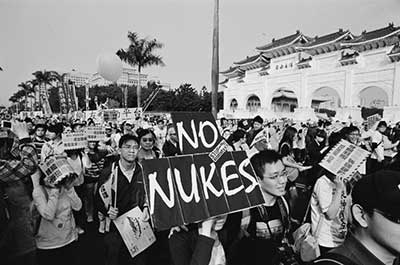Date: 21/11/2022
Relevance: GS 2: Important International institutions, agencies, and fora, their structure, and mandate.
Key Phrases: International Court of Justice, Nuclear Weapons, humanitarian laws of war, Treaty on the Prohibition of Nuclear Weapons (TPNW), non-nuclear states, Ukraine conflict, Conference on Disarmament.
Why in News?
- In the past few days, there has been much talk and considerable apprehension about the use of nuclear weapons as a result of the Ukraine conflict.
ICJ ruling on nuclear weapons in the absence of any law on the subject in 1996:
- Nearly 30 years ago the International Court of Justice was requested by the UN for an Advisory Opinion “as to whether the threat or use of Nuclear Weapons in any circumstance was permitted under International law”.
- Representatives of 22 nation-states appeared before the ICJ and made written and oral submissions.
- In the end, a majority of 12 out of 15 judges said: “that humanitarian law has to be read subject to an exception viz. that it permitted a State to use Nuclear Weapons in self-defence when its survival was at stake, even where such use would otherwise be a breach of humanitarian law.”
- Dissent by three Judges:
- Only three judges disagreed — Judge Weeramantry of Sri Lanka, Judge Shahabuddin of Guyana, and Judge Koroma of Sierra Leone. All three were from the developing world.
- They said that the concept of the humanitarian laws of war was not a recent invention, nor the product of any one culture.
- It was deep-rooted in many ancient cultures — Buddhist, Hindu, Chinese, Christian, Islamic and traditional African.
- Each of these cultures had given expression to a variety of means that can be used for the purposes of fighting one’s enemy.
- They also said that the problem under consideration was universal, and the world court being a universal court, its composition “should reflect the world’s principal cultural traditions”.
- The dissenting three judges were against any use of “hyper-destructive” weapons in any circumstances.
Treaty on the Prohibition of Nuclear Weapons (TPNW):
- In 2022, the world does have international law in the UN Treaty on the Prohibition of Nuclear Weapons (TPNW), passed in January 2021. It now constitutes the law on the subject.
- It was passed by 122 members of the UN General Assembly — a clear majority — and has entered into force after its ratification by 50 member-States of the UN. The number of signatories has since risen to 91.
- Thus, a treaty with binding force has now become part and parcel of international law on the subject.
- Any threat or use of nuclear weapons is now a clear violation of international law.
Need for fresh consideration by ICJ:
- The latest view has not yet been referred to the ICJ to ascertain whether in their view legislation passed by the UN by an overwhelming majority and now ratified by more than the required number to enter into force, would over-rule the three-decades-old opinion of the International Court, which was not unanimous and did not represent the views of the developing world.
- Indeed, back in 1996, the minority opinion of the three judges of the ICJ from developing countries (Sri Lanka, Guyana, and Sierra Leone) was against any use of “hyper-destructive” weapons in any circumstances.
- This is now the position taken by an overwhelming majority of member-states of the UN.
- Therefore, the highest priority should now be attached to taking the issue before the ICJ for fresh consideration of the issue.
India’s stand on the Treaty on the Prohibition of Nuclear Weapons:
- India did not vote in favour of the Treaty on the Prohibition of Nuclear Weapons.
- This is in sharp contrast to the vocal opposition that Mahatma Gandhi, Jawaharlal Nehru and Indira Gandhi expressed to the possession, threat, and use of nuclear weapons.
- In the absence of other nuclear weapon countries, India joining the treaty may amount to opting for unilateral nuclear disarmament. This cannot be recommended to a country, which is surrounded by two hostile nuclear neighbours.
- New Delhi had rejected the treaty for two main reasons:
- Not negotiated in the right forum or in the right manner:
- India believes that the appropriate forum for negotiating complex dimensions of nuclear elimination is the Conference on Disarmament, a UN body comprising 65 nations, that follows consensus-based decision-making.
- India considers it critical to take all stakeholders along on this subject.
- Not doing so could result in an outcome unacceptable to key players, as seems to have happened with the TPNW.
- Lack of attention to issues of verification and compliance:
- The treaty exhorts NWPs to join by removing nuclear weapons “from operational status immediately and to destroy them in accordance with a legally binding, time-bound plan.”
- However, these terminologies are not defined. Nor does the treaty establish who would monitor and certify the progress of elimination as per schedule, or how non-compliance would be addressed.
- Not negotiated in the right forum or in the right manner:
- With such fundamental questions left unanswered, India found the treaty insufficient to promote real disarmament.
Conclusion:
- India would be the first de facto nuclear weapon state to promote the disarmament of these extremely dangerous weapons if it were to assume its customary leadership position in such things.
- It is a clarion call to renew the stand for which India was once renowned and thus become the only state with the capacity and stockpile of nuclear weapons to join the current tide of world opinion that desires the prohibition of these weapons.
- In order to develop a framework for a nuclear-free world, India must take on the role of a global leader and should collaborate with all countries, both nuclear and non-nuclear.
Source: The Indian Express
Mains Question:
Q. “In an age of growing multilateralism and globalized economics, nuclear weapons appear more symbolic than strategic.” Evaluate.








